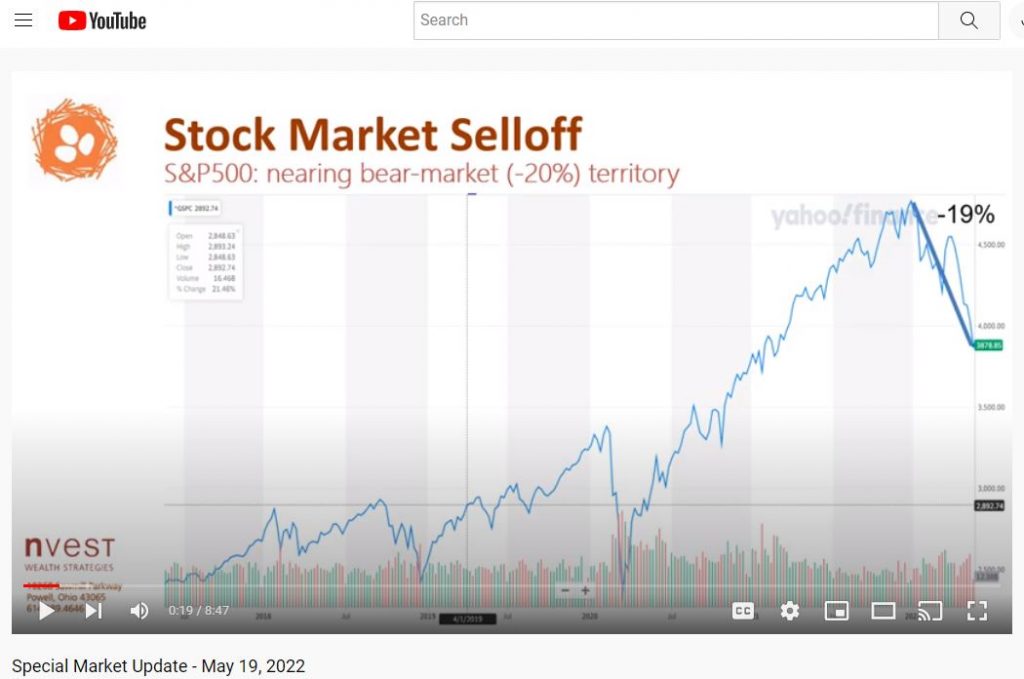When the Beatles’ manager Brian Epstein died in 1967, the band needed to handle more of their accounting and business affairs. George Harrison disliked these duties. He wrote “Here Comes the Sun” after attending a round of business meetings. The song was inspired by the long winters in England which Harrison thought went on forever.
All investors are uncomfortable in this uncertain economic environment. Financial market volatility only exasperates feelings of uncertainty. Uncertainty is defined as being unsure of something; uncertain things are undecided, unknown, or doubtful. Uncertainty interrupts our ability to plan for the future. Uncertainty often creates feelings that bad will last forever. When something small or big, like financial market volatility and large drawdowns occur, we surmise our reduced savings (we often refer to as your “life effort compressed”) will ruin our future lifestyle and plans. And we are uncertain about being able to rely on past experiences to provide psychological comfort about our future (“this time always feels different”). In essence, we are unable to see the future; it’s like being in a fog. Being uncertain does not mean all is lost or failing. It’s important to remember that uncertainty is part of life (and investing).
As discussed in several commentaries this year, 2022 is proving to be the year of rates – inflation and interest rates. Both are rising. Rising inflation is running high and ahead of interest rates. Both are creating uncertainty everywhere – consumers, businesses, governments, and investors, and for you and me. Both bonds and stocks are struggling with how government – Federal Reserve policy in particular – will respond; how fast and how aggressive. Aggressive appears to be the current pursuit by the Fed. Uncertainty is showing up in daily volatility displayed in the financial markets, both stocks and bonds.
Yesterday (May 18), the S&P dropped over -4%; one of its largest daily declines this year. Stocks (SP500) are down roughly -19% since the start of the year; -18% on a total return basis when including dividend income. Those returns are approaching bear market territory – defined as a drawdown of -20%. Daily market volatility is unnerving and stressful. Bonds too are struggling, with the most watched bond index declining close to -10%; worst bond return in 40 years. [Bonds usually provide a buffer, or hedge to stocks when they are going through “rainy days”.] Fed action to raise interest rates to curb sticky inflation (over +8%, highest in 40 years) appears late and lends to uncertainty. There is a growing concern that their aggressive tightening efforts may create an economic recession with rising unemployment (that’s just 2 years out from the COVID Great Lockdown).
What should investors be thinking and doing? Let’s consider reactions and behavior appropriate during uncertainty. After all, that is where we are living and caught right now.
- Focus on what you can control, and avoid reacting based on emotion.
- Do not alter long-term investment objectives (bonds usually protect and are starting to resume being a stock market drawdown buffer), but don’t boost bond exposures which cannot fight inflation (a big investor enemy). Doing in times of stress is not correct; doing nothing can be correct. “Buckets of Time” investing does work, even if it appears to be absent at the moment; it provides portfolio flexibility.
- Do not consider taking large withdrawals from investments that are experiencing “rainy days.” Both of these actions permanently destroy capital, removing recovery of value when markets rebound; that truly hurts long term financial plans/goals.
- All market drawdowns appear – feel and look – different. That’s because the issues appear different than recollections of the past. Drawdowns are part of investing!! Looking at S&P500 returns since 1952, intra-year declines in the S&P500 averaged -14%; yet annual price returns were positive in 51 of those 70 calendar years. 20-year annualized returns for stocks were +9.5%, while the average investor earned only 3.6% (due to timing the market = worry and uncertainty. Meaning – the past offers guides to the current/future.
- It never feels like a low at/near the low. Yet, near the low is when most want to make emotional changes. What was Warren Buffett doing, according to the Wall Street Journal article (page B1) of Tuesday May 17? The article title read, “Buffett Buys Stocks as Markets Fall.” Be opportunistic! Be a long term investor. Following emotion when investing will lead to an uninspiring investment return experience. “Be greedy when others are fearful.” “You don’t have to be smarter than the rest. You have to be more disciplined than the rest.” In other words, don’t respond different because of a foggy uncertainty.
At present, we feel unable to see vary far; the future appears obscure. We extrapolate recent pain too far into the future. The fear in the markets is not over yet. Emotions compel us to take action, to take control; to make inappropriate changes. What’s the plan? Add to your savings/investments – yes or no? We recommend continuing your investment pursuits, seasoned with expectations for softer stock returns and higher bond yields. Remember, “rainy days” will ultimately give way to return of sunshine – “Here Comes the Sun!”
Also, check out our link with audio: “slides for concerned investors”

Bill Henderly, CFA | Nvest Wealth Strategies